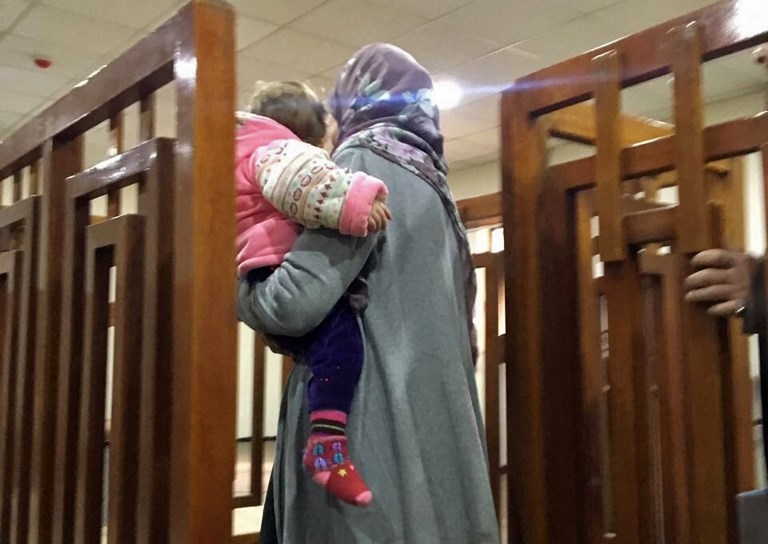Iraq court jails French woman for 20 years over Islamic State membership

An Iraqi court on Sunday jailed a French woman for 20 years for belonging to the Islamic State (IS) group as her lawyers accused authorities in Paris of "interference" to prevent her returning to France.
Melina Boughedir, a mother of four, was sentenced last February to seven months in prison for "illegal" entry into the country, and was set to be deported back to France.
But another court ordered the re-trial of the 27-year-old French citizen under Iraq's anti-terror law.
On Sunday, she was found guilty of membership of IS and handed a life sentence - which in Iraq is equivalent to 20 years.
"I am innocent," Boughedir told the judge in French.
"My husband duped me and then threatened to leave with the children" unless she followed him to Iraq, where he planned on joining IS, she said.
"I am opposed to the ideology of the Islamic group and condemn the actions of my husband," she added.
Her Iraqi lawyer, Nasureddin Madlul Abd, urged the court to acquit Boughedir, describing her spouse as a "jailkeeper not a husband" who had "forced" her to join him in Iraq.
Her French defence team - William Bourdon, Martin Pradel and Vincent Brengarth - said they were "relieved" she had been spared the death penalty, but vowed to appeal the verdict.
“We’ve escaped the death penalty, and obviously that was our greatest fear. But this is still a very heavy sentence,” Brengarth told FRANCE 24 from Baghdad. “This decision was taken at the end of a trial that did not respect the principles of a fair hearing.
“We have the feeling that the verdict had already been decided upon, and indeed it was delivered immediately,” he added.
In Paris, the foreign ministry said France respected sovereign Iraqi justice.
"We note that the judicial procedure is not over," the ministry told AFP.
"France will continue to respect the sovereignty of Iraqi jurisdiction and the independent judicial proceedings."
Boughedir, who wore a black dress and headscarf, arrived in the courtroom carrying her youngest daughter in her arms. Her three other children are now back in France.
Hers is the latest in a series of verdicts doled out to foreigners who flocked to join IS in its self-declared "caliphate" after the militant group seized the northern third of Iraq and swathes of Syria in 2014.
On 22 May, an Iraqi court sentenced Belgian militant Tarik Jadaoun, also known as Abu Hamza al-Beljiki, to death by hanging - although he pleaded not guilty to a range of terror charges.
Jadaoun had earned the moniker "the new Abaaoud", after his compatriot Abdelhamid Abaaoud, one of the organisers of November 2015 attacks in Paris.
Even before she was sentenced, Boughedir's case sparked anger from her defence team, who had accused French authorities of interfering.
On Thursday, French Foreign Minister Jean-Yves Le Drian said Boughedir was a "Daesh (IS) terrorist who fought against Iraq" and should be tried on Iraqi soil.
Her French lawyers sent a letter of protest to Le Drian, seen by AFP, in which they denounced "pressure on the Iraqi judicial system" and "unacceptable interference".
Earlier in the week, Le Drian called on Iraq to avoid giving Boughedir the death penalty, but reiterated past comments that she should stand trial in Iraq, FRANCE 24 reported.
“When you go to Mosul in 2016, it’s to go fight, and she will be judged where she acted. It’s common sense,” Le Drian said.
Bourdon on Sunday condemned the verdict, saying it had been influenced by "extra-judicial reasons".
During the hearing, which lasted about one hour, the judge asked Boughedir - who was arrested in the summer of 2017 in Mosul - to explain why and under what circumstances she had arrived in Iraq.
He then declared that "the proof that has been gathered is enough to condemn the criminal" to a life sentence.
Bourdon said Le Drian wanted his client to be tried in Iraq to "ensure that she won't be heading back home to France any time soon", as part of efforts to prevent the return of militants.
Boughedir's family and her defence team want her to face a court in France, Bourdon said.
After being sentenced in February to seven months in prison for "illegal" entry, she was set to be deported home.
But upon re-examining her file, an Iraqi court said she had "knowingly" followed her husband to Iraq to join IS.
Boughedir's husband is believed to have been killed during operations by US-led coalition-backed Iraqi forces to regain control of Mosul, Iraq's second city and the militants' former stronghold.
On Sunday, she told the court that the man she had been married to for five years had disappeared one day, walking out and saying he was going out "to look for water".
Since then, she said, she has received no information about his fate or his whereabouts.
Boughedir is the second French citizen sentenced to life in prison by an Iraqi court for belonging to IS, after Djamila Boutoutaou, 29, in April. Boutoutaou also said she had been tricked by her husband.
Thousands of foreign fighters from across the world flocked to the black banner of the militants after the group seized swathes of Iraq and Syria in 2014.
Multiple offensives have since reduced their "caliphate" to a sliver of desert in the east of war-torn Syria.
Iraqi courts have sentenced to death more than 300 people, including dozens of foreigners, for belonging to IS, judicial sources have said.
Dozens of French citizens suspected of having joined IS are believed to be in detention in Iraq and Syria, including several minors.
Middle East Eye propose une couverture et une analyse indépendantes et incomparables du Moyen-Orient, de l’Afrique du Nord et d’autres régions du monde. Pour en savoir plus sur la reprise de ce contenu et les frais qui s’appliquent, veuillez remplir ce formulaire [en anglais]. Pour en savoir plus sur MEE, cliquez ici [en anglais].




